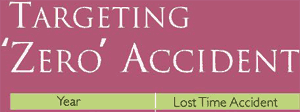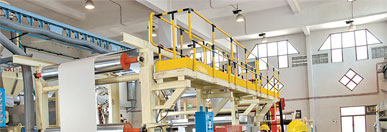|
The Central Pollution Control Board has reported that even in large
and medium cities in India, the major mode of solid waste disposal
is by land filling/dumping.
In most cases, the dumping sites are not only serious health hazards
to people living in the neighbourhood but are liable to contaminate
ground water.
ITC’s unique endeavour to recycle all the solid waste generated by
the Company’s operations is a pathbreaking, socially and
environmentally responsible initiative.
During 2006-07, ITC’s businesses made significant progress towards
achieving the organisation’s ‘zero solid waste’ goal
through total recycling.
Total recycling of solid waste in ITC improved to 93%
in 2006-07 from 78.7% in the previous year. Cigarette factories at Bengaluru, Saharanpur and Kolkata, Leaf Threshing unit at Anaparti, Specialty Paper unit at Tribeni, the Green Centre at Gurgaon and ITC Hotels Maurya, Maratha, Grand Central, Sonar, Mughal, Rajputana and Chola achieved nearly 100% recycling of all solid waste.
In fact, overall solid waste recycling has improved to 96.2%
in the 4th quarter of 2006-07.
|
|
ITC remains committed to maintaining the highest standards in
Environment, Occupational Health & Safety in all its operations. All
ITC manufacturing units and the Corporate EHS Department have OHSAS
18001 certification. All these units, all major ITC Hotels and the
ITC R&D Centre in Bengaluru have ISO 14001 certification.
Every ITC unit is focused on becoming accident-free. In 2006-07,
there was no lost-time accident or injury at the Cigarette factories
in Saharanpur, Bengaluru and Kolkata, the Packaging & Printing
factory at Munger; Paperboards unit at Kovai; Research Centres at
Bengaluru and Rajahmundry and the Gurgaon Pilot Plant of the
Lifestyle Retailing business.
In the ITC-Welcomgroup hotel chain, Maurya, Mughal, Chola, Maratha,
Grand Central, Sonar, Rajputana, WelcomHotel, New Delhi and Windsor
remained free from lost-time accident or injury.
|
|

On the basis of the work undertaken,
nothing has come to our attention that would cause us not to believe
that:
The information for the indicators stated above at (2) under Scope
of Review* has been stated in a fair and balanced manner. (*Review
of the following short-listed HSE indicators: a. Energy, b.Water, c.
Air emissions, d. Solid waste, e. Accidents)
Completeness: Based on the limited sample of our review, we consider
that the data and text presented in the Director’s Report relating
to ITC’s HSE performance and management addresses the significant
aspects of ITC’s businesses.
Reliability: The EHS reporting system is aligned with the management
systems which are in turn embedded in most business processes. The
process for 2006-07 HSE data collation was found to be consistent
within the context of the existing management systems at the
Corporate and Division levels and the common framework for reporting
established within the organisation. The completeness of
documentation to support HSE parameters varied from unit to unit at
the four sites visited by us; however, an overall improvement in the
data completeness and reliability could be discerned as compared to
previous years. Tapan Ray
Executive Director
PricewaterhouseCoopers Private Limited
Dated: May 2, 2007
Place: Mumbai |
|





